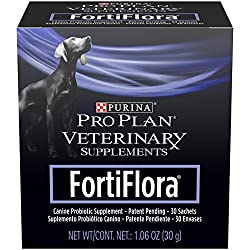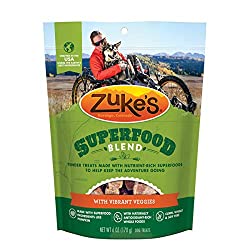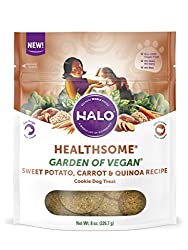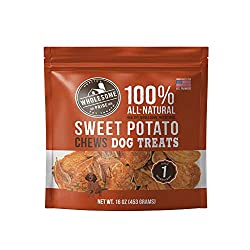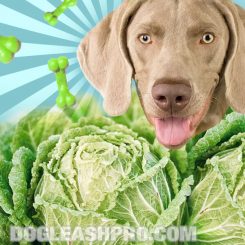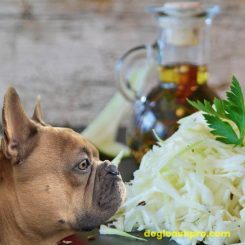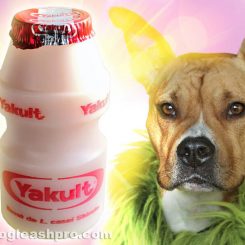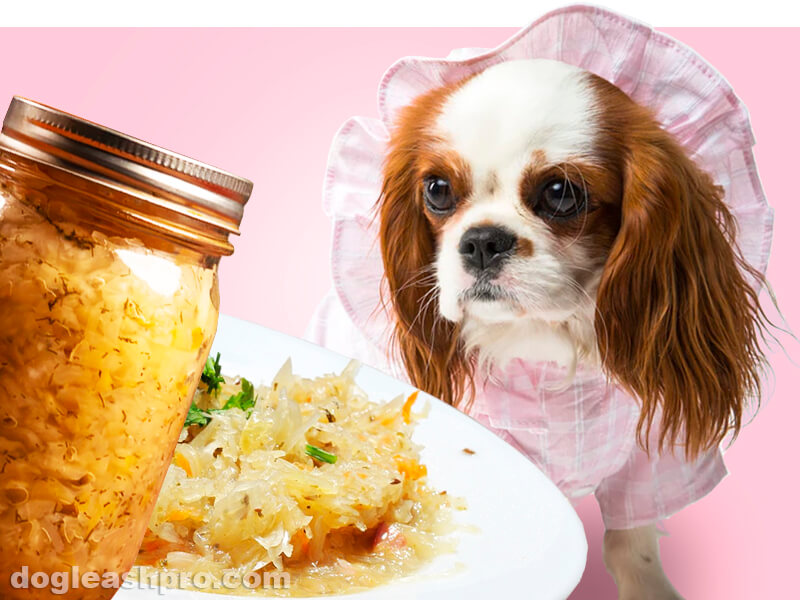
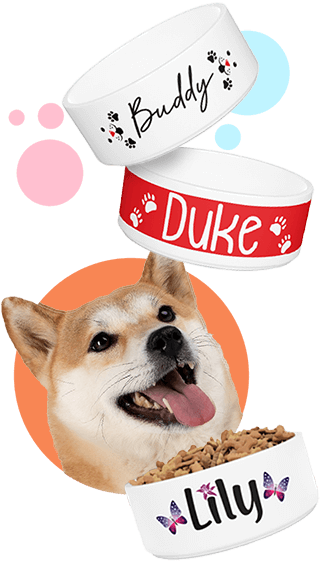
Last Sunday as I was preparing lunch for my parents, I accidentally spilled a spoonful of Sauerkraut onto the kitchen floor. As always, my two dogs came over and licked it off the floor even before I had the chance to wipe it up. Having never fed my two canine friends Sauerkraut before, I became worried as I wonder if Sauerkraut is safe for dogs to eat.
Can dogs eat Sauerkraut? Yes, dogs can eat Sauerkraut as it is perfectly safe for dogs. In fact, Sauerkraut can be a very healthy addition to your dog’s diet. Make sure the Sauerkraut is plain and free from any added spices.
While Sauerkraut and Coleslaw share the same main ingredient, cabbage, Sauerkraut is safer for dogs to eat than Coleslaw. Below, we will discuss why this is and what is in Sauerkraut that is good for dogs.
Table of Contents
Is Sauerkraut good for dogs?
The short answer is yes, Sauerkraut is good for dogs when eaten in moderation without the extra ingredients like caraway seeds. To fully answer this question, it’s crucial to know what Sauerkraut is, what it is made of, and why cabbage in the Sauerkraut is safe for dogs to eat.
What is Sauerkraut?
Sauerkraut is fermented raw cabbage. Its unique sour taste makes it an excellent side dish.
Where does Sauerkraut come from?
Although Sauerkraut is a German word—meaning “sour cabbage”—the condiment likely originated in China. Sauerkraut is available in all major grocery stores, but you can also make it at home.
What is Sauerkraut made of?
Sauerkraut is usually made with just two ingredients: cabbage and salt.
How is Sauerkraut made?

While there are many different recipes for Sauerkraut, the most basic one requires a fresh, raw cabbage to be finely shredded and mixed with a tablespoon of salt. The mixture is then placed inside a Mason jar and left to ferment for 1 to 4 weeks.
During this time, the bacteria released by mixing salt and cabbage produce lactic acid. This ferments the cabbage without letting it rot.
What are the ingredients in Sauerkraut?
While there are two main ingredients in Sauerkraut (cabbage fermented with salt), different recipes call for other ingredients too. Let’s take a look at the ingredients in Sauerkraut and see how each component affects our canine friends’ bodies.
1. Cabbage (Safe in moderation)
Cabbage is harmless for dogs in moderate quantities. However, it does contain a chemical called thiocyanate—an excess of which can lead to thyroid disorders in dogs.
Cooking or fermenting the cabbage neutralizes this chemical and makes the cabbage safe to eat.
2. Salt (Harmful in large amount)
Sauerkraut can be very salty. Excessive salt does dogs no favors. It can affect your furry friend’s vital organs and can cause the following:
- Hypertension.
- Dehydration.
- Excessive urination.
- Sodium poisoning.
3. Caraway seeds (Harmful in large amount)
Caraway seeds are thin, dark-colored seeds that many traditional Sauerkraut recipes call for. They’re also called cumin, fennel, or black jeera.
Caraway seeds can be lethal to dogs. Depending on how much your canine ate, caraway poisoning can cause the following symptoms:
- Decreased blood sugar.
- Vomiting.
- Diarrhea.
- Convulsions.
- Shivering.
- Disorientation.
- Breathing problems.
Long term consumption of caraway seeds can even result in:
- Liver damage.
- Kidney damage.
- Cancer.
Fun Fact: When feeding your canine companions, it’s always best to stick to dog food. Feeding them food that’s meant for human consumption like Horseradish is a bad idea as it is naturally spicy and can irritate your pup’s mouth and throat. It can even cause poisoning.
Homemade Sauerkraut vs. store-bought Sauerkraut

The best thing about homemade Sauerkraut is that you know exactly what is in it. Commercially available Sauerkraut contains preservatives and chemicals, which makes it unfit for dogs.
Another thing to consider with the store-bought variety is the sodium content. While homemade Sauerkraut is salty, some commercial ones pack a lot more sodium. Our canine friends don’t do well with too much salt in their diet and may succumb to sodium poisoning.
Different spices in store-bought Sauerkraut can also make it unhealthy for dogs. Ingredients such as garlic and onion can lead to anemia, while caraway and mustard seeds can cause a number of gastrointestinal problems in dogs.
Store-bought Sauerkraut is more convenient to get and use. But when it comes to the best health of your four-legged friends, homemade Sauerkraut is worth the extra effort.
So if you’re ever wondering, is Sauerkraut bad for dogs, then it’s due to the high sodium, presence of caraway seeds, and the use of onion or garlic in the Sauerkraut. When it comes to your dog’s health and consumption, it also matters whether you made the Sauerkraut at home or purchased it from the store.
What are Sauerkraut probiotics and how do they improve a dog’s health?
Probiotics are living organisms that are also known as the “good” kind of bacteria. Probiotics have numerous health benefits for dogs.
- Probiotics support the growth of good bacteria and fight off the foul kind of bacteria in the stomach.
- Probiotics may reduce the risk of allergies, such as sensitivity to foods and some seasonal allergies.
- Probiotics keep gastrointestinal diseases at bay by removing the responsible microbes.
- Probiotics support the dog’s cardiac health by keeping cholesterol under control.
- Probiotics absorb fats, reducing obesity in dogs.
- Probiotics help expel toxins and pollutants from the dog’s body.
- Probiotics support quick recovery from diseases by making the immune system stronger.
- Probiotics may reduce anxiety and nervousness among stressed and disturbed dogs.
If you prefer a probiotic dog supplement for your canine friends, we highly recommend this one:
Fun Fact: When consumed in moderation, Goji Berries can also help improve your dog’s immune system.
Tips when feeding your dogs Sauerkraut
No matter how healthy Sauerkraut is, your furry friends may not be too fond of the sour taste. We’ve provided several helpful tips to get your pooch to eat this wholesome veggie.
- The Sauerkraut odor can be a turnoff for dogs since their noses are very sensitive. A helpful tip is to mask the Sauerkraut smell with something even smellier, like fish or fish sauce.
- Dogs usually won’t eat the Sauerkraut plain, which is why you may want to mix it in with their favorite dog food.
- You can also mix it with something sweet, like apple juice, or cook it with apples. The sweet taste will cover the kraut’s sourness.
- A dog’s stomach may not agree with this new food, so make sure to start small. Add a tiny amount of Sauerkraut to the dog’s food and increase it little by little. Try to skip a day or two in between.
- The high salt content—mainly in commercially available Sauerkraut—can be problematic. Rinsing the Sauerkraut with water before feeding it to your dog can reduce the salt content by almost half.
When shouldn’t you feed Sauerkraut to your dog?
If your dog is overly sensitive to sodium, the salt in Sauerkraut won’t do them any favors. Excessive sodium consumption is not ideal for canines, and if your pooch has had its daily sodium quota, you should keep the Sauerkraut away.
Spicy or seasoned Sauerkraut poses a risk, as the spices may be toxic to dogs. When feeding Sauerkraut to your canine friends, make sure it’s free from mustard seeds, caraway seeds, onion, and garlic. These ingredients can be lethal for dogs.
Does Sauerkraut provide any nutritional benefit for your dog?

Sauerkraut is very beneficial for your dog’s health. And here are the reason why:
- The vitamins and minerals in the condiment improve the dog’s eyesight, skin, bones, and fur.
- The antioxidants in the kraut rid the dog’s body of pollutants and slow down aging in cells.
- The fiber and probiotics keep the dog’s heart, stomach, and overall health in tip-top shape.
- Dogs who eat Sauerkraut and other fermented foods are less prone to allergies, gastrointestinal issues, cardiac diseases, and cancer.
Fun Fact: Antioxidants in Peppermint tea also help to reduce inflammation in the dog’s liver and intestines.
What if my dog accidentally eats lots of Sauerkraut?
Dogs usually don’t like Sauerkraut that much due to its sour and pungent odor. However, if your canine friends eat a fair share of the Sauerkraut, they may run the risk of sodium poisoning.
Depending on how salty the kraut was, sodium poisoning will likely fix itself by making the dog vomit and throw out the problematic food. This can worsen the dehydration caused by the salt, so make sure to give your pooch plenty of fluids. Call your vet to ask if you need to bring your pup in for a physical checkup.
Sauerkraut that is seasoned with fennel, cumin, or caraway seeds can cause toxicity in dogs. Again, this will likely result in vomiting and worsen the symptoms. A quick trip to the vet is necessary if your dog has ingested caraway seeds.
Sauerkraut with garlic or onion will also cause diarrhea and vomiting in dogs. These are also toxic ingredients and warrant a call or trip to the vet.
Symptoms to watch for
While plain Sauerkraut is safe in moderation, too much of it can lead to sodium poisoning. The presence of seasoning in the kraut can also turn it into a health hazard. Onion and garlic are toxic to dogs, while caraway seeds can lead to a host of canine problems.
Symptoms for sodium poisoning include:
- Excessive urination.
- Fever.
- Muscle spasm.
- Runny stool.
- Weakness.
- Convulsions.
- Dizziness.
Symptoms for onion or garlic toxicity include:
- Breathing problem.
- Vomiting.
- Weakness.
- Decreased appetite.
- Diarrhea.
Symptoms for caraway seed poisoning include:
- Convulsions.
- Vomiting.
- Diarrhea.
- Muscle spasm.
- Drooling.
- Dizziness.
- Difficulty breathing.
Dog-friendly and safe non-toxic Sauerkraut alternatives
If you don’t want to feed your four-legged friends Sauerkraut—or if your pups hate the taste—you can try some of these gut-friendly, delectable delicacies for your furry friends.
- Cooked cabbage. Although raw cabbage is safe for dogs in moderation, you can regularly feed cooked cabbage to dogs. It’s rich in fiber, antioxidants, and vitamins.
- Kefir is packed with probiotics and yeasts. These microbes strengthen the good bacteria in the dog’s gut. For lactose intolerant dogs, you can try kefir made with non-dairy sources.
- Cottage cheese is another fermented food that also makes for a rewarding snack. Cottage cheese is low in both sodium and fat and it is packed with proteins and vitamins.
- Apple Cider Vinegar. Just a small dose of apple cider vinegar can improve your pup’s immune system and keeps their gut healthy. Additionally, apple cider vinegar is both anti-inflammatory and can improve your pup’s coat quality.
- Bok choy. This Chinese cabbage is loaded with vitamins A, K, and C and has high fiber content, making it friendly for your dog’s belly.
- Chickpeas. Aside from keeping your dog’s immunity and vision in top form, cooked chickpeas also keep the dog’s stomach healthy and clean.
- Greek yogurt is high in probiotics and can keep gut diseases away from your furry friends.
I also provide these dog snacks to my pups which they absolutely love:
Fun Fact: Cooked chickpeas are healthy for dogs. However, when it is added with garlic, onion, lemon juice, and salt to make Hummus, it becomes dangerous for our canine friends.
How do you make Sauerkraut for dogs at home?
Plain, un-spiced Sauerkraut is best for dogs. Start by thinly slicing fresh cabbage. Pour a tablespoon of salt and mix it while squeezing. When it begins to release juices, pour it in a mason jar and leave it for 1 to 4 weeks in a warm place.
After the Sauerkraut is ready, you may feed it to your canine friend as is. Some dogs mind the smell, If your pooch is one of them, you can start by adding small amounts of it to their food. It’s best to make sure that you do not go overboard as it can give dogs gas. The salt in Sauerkraut is another thing to keep an eye on.
So, can dogs eat Sauerkraut?
Dogs can definitely eat Sauerkraut, but be sure to feed them Sauerkraut in moderation. Homemade Sauerkraut is always best as you can control the ingredients in it. If you’re feeding your pooch store-bought Sauerkraut, make sure to rinse it a little so it’s not too salty.
Having Sauerkraut occasionally and sticking to your dog’s regular food is always the best.
Related Questions
Yes, Sauerkraut is good for dogs to eat. It is not only safe, but also a healthy addition to your dog’s diet.
Yes, dogs can eat canned Sauerkraut. As long as the canned Sauerkraut does not contain too much sodium or toxic seasonings.
Yes, dogs can eat cooked Sauerkraut. While cooked Sauerkraut is safe for dogs, it may not be as healthy as raw Sauerkraut. Cooking at a high temperature destroys Sauerkraut’s valuable probiotics.
Yes, dogs can eat uncooked Sauerkraut. Uncooked Sauerkraut is packed with vital nutrients and probiotics and is very healthy for dogs.
No, dogs should not eat Sauerkraut with caraway seeds. Caraway seeds are toxic for dogs and can cause a myriad of diseases.
Try masking the Sauerkraut’s odor by adding it to strong-scented dog food. If your furry friends seem to digest it without problems, you may increase the Sauerkraut’s quantity.
Yes, but in moderation. Canned or store-bought Sauerkraut can be pretty high in sodium.
Yes, warm homemade Sauerkraut is the safest for dogs. Warm homemade Sauerkraut will still be packed with probiotics as they can tolerate temperatures below 115°F.
Yes, if the pork is plain and unseasoned. If so, pork and Sauerkraut are perfectly fine for your pup.
No, cooked cabbage will not hurt your dog. Cooked cabbage is even safer and healthier than raw cabbage. Cooking eliminates thiocyanate—a chemical that can cause thyroid issues in dogs—present in raw cabbages.
Yes, dogs can eat pickled cabbage. Pickled cabbage is different from Sauerkraut. While Sauerkraut is fermented in salt, pickled cabbage is cured in vinegar. Vinegar is safe for dogs, as is cabbage.
Cooked, fermented raw, or pickled, all forms of these cabbage are safe for dogs.
DISCLAIMER: THIS WEBSITE DOES NOT PROVIDE MEDICAL ADVICE
The information, including but not limited to, text, graphics, images and other material contained on this website are for informational purposes only. No material on this site is intended to be a substitute for professional veterinary advice, diagnosis, or treatment. Always seek the advice of your veterinarian or other qualified health care provider with any questions you may have regarding dietary needs.
Resources:
https://en.wikipedia.org/wiki/Sauerkraut
https://www.nutritionix.com/food/sauerkraut/1-cup

With over five years of specialized experience as an animal writer, my expertise lies in dog nutrition, health, behavior, grooming, and training. I am dedicated to delivering helpful and informative content that caters to the well-being of our furry friends. My primary goal is to empower pet owners with knowledge and ensure our canine companions thrive in health and happiness. In my free time, I love volunteering at local dog rescue centers.



